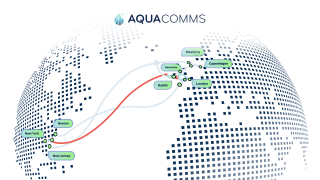|
|
In the first half of 2012, mobile operators in the UK will finally be able to bid for two vital chunks of spectrum - the 800MHz and 2.6GHz bands - that will enable 4G networks. By that point, almost three years would have passed since the original date which the UK regulator Ofcom had earmarked to hold the spectrum auction. The delay to the auction was the result of a lengthy and heated dispute between the country's mobile operators over the distribution of existing spectrum, but the UK is far from being the only country where a spectrum auction is sparking controversy. The scale of India's spectrum scandal for example, in which it emerged that 2G spectrum phone licences were sold for a fraction of their value, costing the government an estimated $37 billion in lost revenues, has generated headlines worldwide and led to the resignation of the country's information technology and communications minister.
As mobile data consumption continues to grow at a phenomenal rate, the need to release new spectrum which can be utilised for 4G (see this month's cover story) is becoming increasingly paramount. According to Matthew Howett, senior analyst at Ovum, spectrum auctions are commonly contested across the globe, but the urgency surrounding the release of new spectrum for 4G could in many instances lead to compromises between mobile operators.
"There has been a long-standing dispute in the industry regarding how new spectrum should be released, particularly given that the existing spectrum holders have unequal holdings of some of the prime spectrum bands. Often the dispute comes down to whether some operators should be made to give up spectrum so that the playing field can be levelled," Howett says.
"However, while a few years ago there was room to play around with legal challenges, it is now becoming more crucial for auctions to be held. Given the explosion in mobile data, many operators now desperately lack capacity in their network and there is perhaps going to be more of a willingness to make auctions happen and keep it out of the courts."
The issue in the UK
Certainly the key issue behind the delay of the UK spectrum auctions is the disparity of spectrum ownership between mobile operators, with O2 and Vodafone's exclusive ownership of the 900MHz being a prime bone of contention. The bandwidth was originally allocated to the two operators for 2G services, but the UK government recommended that the spectrum also be freed up for 3G services. This prompted the two mobile operators to launch legal action against the regulator.
The merger of T-Mobile and Orange in 2010, which led to the creation of Everything Everywhere, helped level the UK playing field and prompted Ofcom to drop plans to 're-farm' the 900MHz spectrum. Such tensions highlight the fierce competition between operators, which are well aware of the deep knock-on-effects of each spectrum auction. The UK law was changed in 1998 to allow spectrum to be auctioned, and the first UK spectrum auction was subsequently held for 3G in 2000, which was run by Ofcom's predecessor the Radiocommunications Agency (RA). "At the time, the industry was new to the auction concept and it wasn't hugely controversial. In hindsight, we can say that the government designed it very well and benefited very well financially. Since then, limited spectrum has been made available and that's why this forthcoming auction is so important. There is a significant amount of spectrum becoming available and it will be sometime until there is anything like it again," says Howett.
Ofcom was introduced in 2003 and according to its director of spectrum markets, Graham Louth, there has since been a "significant change" away from auctioning licences for specific services using specific technologies (eg the 3G auction), to auctioning service and technology neutral licences. "This has in part been made possible by advances in auction theory and practice, allowing spectrum to be auctioned in more flexible ways than were possible back in the early part of this century, and is in part a reflection of the desire to allow operators to respond more quickly and efficiently to the ever faster speed of technological and market change," Louth says.
Ofcom intends to publish details of the procedures that will be used to award spectrum during February 2011. Mobile operators will have several months to respond before the final procedures are published in September of this year. The auction is expected to take place before early 2012, with the spectrum becoming available from 2013, but Howett believes the devil will be in the detail: "It is encouraging that the UK government has given direction to Ofcom, but the main details are yet to be decided and given the importance of the auction, there could yet well be some sort of challenge by the operators."
No surprises
The results of 4G auctions are, however, starting to appear elsewhere in Europe. Germany became the only European country to have completed an auction for 4G spectrum when it opened bidding in April of last year. Despite strong demand, the spectrum auction raised approximately €4.3 billion, falling short of many analysts' predictions and dropping way below the €50 billion raised from the country's auction for 3G licences in 2000.
While the financial outcome of the auction reflects the vast change in the economic environment and perhaps the growing realisation that operators haven't been able to generate the revenues they initially expected from 3G, the main victors of the bid also highlight another worrying trend. Of the four companies competing for the much coveted 800MHz band, three emerged with the majority of the spectrum and all of these belonged to European MNOs: namely Vodafone, Telefonica and Deutsche Telekom.
Erzsebet Fitori, director of regulatory affairs at the European Competitive Telecommunication Association (ECTA), says she believes the outcome of the German 4G auction was entirely foreseeable. "It's no surprise that the three largest operators which belonged to the three largest groups won the best spectrum. The legacy situation in Germany, which is also found across many other European markets, was always going to continue when there are limited remedies built into the spectrum auctioning system that could have helped the fourth operator win a more competitive slice of the spectrum."
Promising proposal
In a bid for change, the ECTA has been strongly supporting a new proposal by the European Commission (EC) that urges member states to take certain measures to prevent spectrum hoarding. The first Radio Spectrum Policy Programme (RSPP) was the key topic of discussion at the Spectrum Summit in March of last year, and it aims to "determine until 2015 how spectrum use can contribute to EU objectives and optimise social, economic and environmental benefits." Part of the EC's broader Digital Agenda, an action plan designed to make best use of information and communication technologies across Europe, the RSPP could potentially have a sharp impact on the allocation of the digital dividend.
"The EC would like to put down a catalogue of pro-competitive solutions that member states can choose from according to the national circumstances. These will help member states create a more level playing field when it comes to spectrum allocation," says Fitori.
"Measures could be anything from introducing spectrum caps, which determine how much spectrum an individual operator is allowed to receive in a particular spectrum auction, to adding agreements that legacy operators redistribute parts of their existing spectrum before acquiring more."
With the RSPP proposal currently awaiting approval from the European Parliament and Council, the programme should be passed just in time to impact the allocation of 4G spectrum in most of its 27 member states. "If the proposal goes ahead, then the changes could be in a relatively short and foreseeable timeframe that will impact the auctioning of the digital dividend across Europe. This could potentially create a more level playing field for all operators as opposed to locking in just a few mobile operators with the largest pockets," says Fitori.
End of the auction era?
While the introduction of measures such as spectrum caps could enable new mobile operators to make a larger impact on the market, such a move also raises serious questions over the viability of auctions as a future means for spectrum allocation. Caps essentially contradict the open market ideals of auctions, with Howett pointing out that "auctions are designed to exploit the consumer surplus because everyone pays what they value, but by limiting the amount you can acquire that forces an intervention in a market mechanism."
Howett goes on to identify that there are currently no credible alternatives to spectrum auctions and that the issue should potentially be put forward to academic debate. "I would be surprised if in 20 years time auctions are still in use as measures such as caps go completely against what you are trying to achieve from a theoretical point of view."
In the meantime, the future requirement for new infrastructure caused by spectrum auctions will ensure carriers are keeping a close eye on developments in Europe. According to Jonathan Wright, commercial director at Interoute, which owns and operates an advanced voice and data network across Europe, the release of 4G spectrum could lead to a huge demand for additional fibre.
"We will see the benefits of 4G in terms of increasing capacity, but on the downside for the mobile network operators a lot of base stations will either need infrastructure improved or increased. Major mobile carrier customers are already looking to connect their fibre network to our core infrastructure, and certainly this includes taking fibre to base stations," says Wright.
Although the impact will not be immediate – after acquiring new spectrum, mobile operators may wait for the right market conditions before deploying them. The consequences could be potentially vast. Wright says: "The figures involved in the next few years are going to be so big that we feel it may challenge standard European business models and see a movement towards outsourcing. Will network operators want to own networks right down to the very last metre of fibre, or will they start looking towards fixed-line operators and alike to run parts of their business for them?"
Auction day |
Rather than taking place over a single day, the UK spectrum auction will run over a number of weeks. Once Ofcom has approved the applications, bidders are provided with information and training on how to access the auction system. "Bidding proceeds through a number of rounds, with up to 10 rounds of bidding taking place on each auction day. At various times during the process, bidders will be required to submit deposits to us, to confirm that they are likely to be able to pay for their bids if they win," says Louth. "Eventually, as the bidding goes up, we would expect to see demand fall to the level where there is no longer excess demand. At this stage, for a number of reasons, we hold a final round of bidding in which the bidders can submit any final offers that they wish to make. We then determine, on the basis of all of the bids received during the auction, what allocation of spectrum to the various bidders will yield the greatest total value (total amount bid). This is the winning allocation." Ofcom uses a 'second price rule' to encourage bidders to be truthful about the value that they place on different allocations of spectrum, rather than trying to shade their bids in order to pay less. Each winning bidder is then required to pay for their licence, which includes money deposited with the regulator in the first instance, before the issue is licensed. The regulator also repays any deposits to the losing bidders provided that they have not breached the auction rules. "Finally, we normally publish full details of the bidding in the auction once it has been completed," says Louth. |




